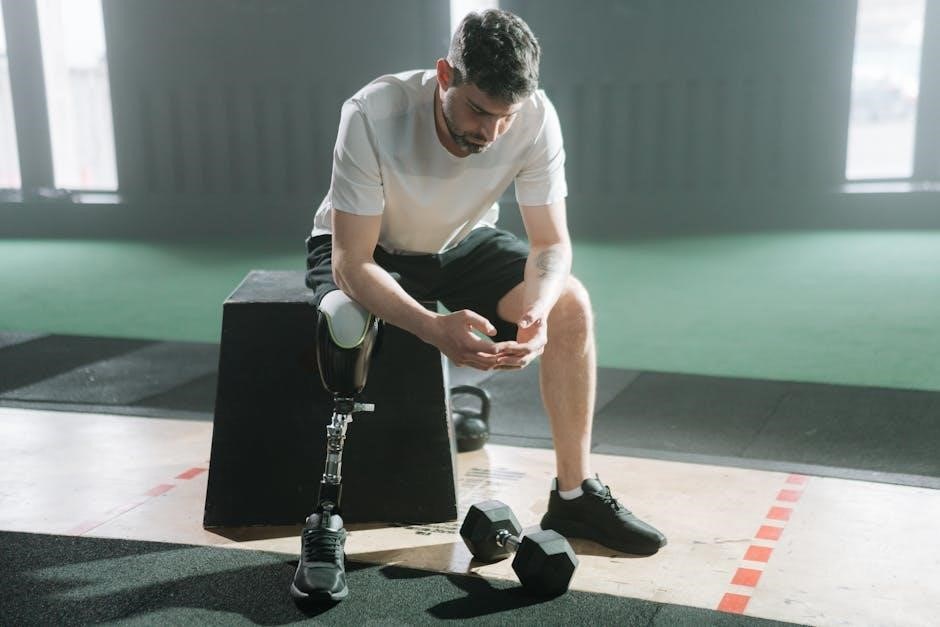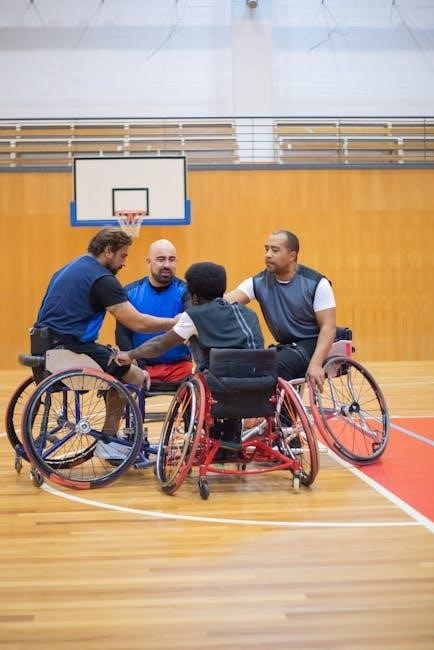Diversity, Equity, and Inclusion (DEI) fosters a culture of belonging, empowering organizations to thrive. Free training materials, like PDF guides and toolkits, provide foundational concepts and practical strategies to promote inclusive workplaces and address challenges like bias and discrimination. These resources are essential for creating equitable environments where all individuals can contribute and grow.
1.1 What is DEI and Why is it Important?
Diversity, Equity, and Inclusion (DEI) refers to practices that promote representation, fairness, and belonging for all individuals. DEI is essential for fostering inclusive cultures, addressing systemic barriers, and ensuring equal opportunities. It enhances collaboration, innovation, and organizational performance. Free training materials, such as PDF guides, provide accessible tools to educate teams on DEI principles, helping organizations create equitable environments where everyone can thrive and contribute meaningfully.
1.2 Benefits of DEI Training in the Workplace
DEI training fosters an inclusive workplace culture, enhancing collaboration and innovation. It improves decision-making by leveraging diverse perspectives and addresses biases, leading to fairer practices. Employees feel valued, boosting engagement and retention. Organizations benefit from enhanced reputation, attracting diverse talent and improving market competitiveness. Free training materials, such as PDF guides, provide cost-effective tools to educate teams, ensuring equitable opportunities and creating a culture of belonging where everyone can thrive and contribute meaningfully to organizational success.
1.3 Challenges in Implementing DEI Initiatives
Implementing DEI initiatives can face resistance due to deeply ingrained biases and cultural norms. Limited resources and lack of expertise often hinder progress, especially in smaller organizations. Measuring the effectiveness of DEI efforts is another challenge, as outcomes may be intangible or take time to materialize. Additionally, ensuring genuine participation and engagement from all employees is crucial, as mandatory training without buy-in can be counterproductive. Addressing these challenges requires tailored strategies and commitment to fostering an inclusive environment.

Sources of Free Diversity and Inclusion Training Materials
Reputable organizations, educational institutions, and online platforms offer free DEI resources, including PDF guides, toolkits, and training modules, to support inclusive workplace and educational environments effectively.
2.1 Reputable Organizations Offering Free Resources
Organizations like the University of Plymouth and the Tor Project provide free DEI resources, including PDF guides and training materials. These tools address topics such as inclusive education, digital security, and workplace equity. Many councils and educational institutions offer downloadable PDFs focused on promoting diversity, equity, and inclusion in various settings. These materials are designed to help organizations and educators create inclusive environments, fostering understanding and empowerment. They are accessible, comprehensive, and tailored to meet diverse needs, making them invaluable for DEI initiatives.
2.2 Publicly Available PDF Guides and Toolkits
Publicly available PDF guides and toolkits provide comprehensive resources for DEI training. For instance, the WFH Equity, Diversity, and Inclusion Policy PDF offers detailed frameworks for fostering inclusivity. Similarly, the University of Plymouth’s EDI toolkits include practical exercises and strategies for educators. These materials often cover topics like bias awareness, inclusive teaching, and workplace equity. Many are downloadable and designed for easy implementation, making them invaluable for organizations and individuals seeking to promote diversity and inclusion in various settings.
2.3 Educational Institutions Providing Free DEI Materials
Educational institutions like the University of Plymouth offer free DEI materials, including toolkits and training resources. These resources are designed to support inclusive teaching and workplace equity. The Academic Success Center and PG Library also provide free materials, such as PDF guides, to promote diversity and tackle discrimination. These tools are invaluable for educators and organizations seeking to create equitable environments. They often include practical exercises and strategies to address bias and foster inclusion in various settings.

Key Components of Effective DEI Training Programs
Effective DEI training includes foundational concepts, interactive activities, and real-life case studies. These elements help build awareness and skills, fostering inclusive environments and addressing specific organizational needs;
3.1 Foundational Concepts and Definitions
Understanding DEI begins with clear definitions and concepts. Diversity encompasses differences in race, gender, and background. Equity ensures fair access to opportunities, while inclusion fosters a sense of belonging. Bias, privilege, and microaggressions are key topics. These concepts form the backbone of effective training, enabling participants to recognize and address barriers. Free PDF guides often include these foundational elements, providing a shared language and framework for discussions. Without these basics, advancing DEI initiatives becomes challenging, making them essential for any training program.
3.2 Interactive Activities and Exercises
Interactive activities are crucial for engaging participants and applying DEI concepts. Free PDF materials often include group discussions, scenario-based exercises, and reflection prompts. These tools encourage active learning, fostering empathy and understanding. Case studies and role-playing activities help participants navigate real-life situations, while quizzes and assessments reinforce knowledge. Such exercises ensure that training is participatory, allowing individuals to share experiences and gain practical insights. This approach makes DEI concepts relatable and actionable, promoting a culture of inclusion and equity in the workplace.
3.3 Real-Life Case Studies and Scenarios
Real-life case studies and scenarios are powerful tools in DEI training, offering practical insights into diversity challenges. Free PDF materials provide detailed narratives of workplace situations, enabling participants to analyze and discuss solutions. These examples highlight issues like bias, inclusion, and equity, helping learners understand their impact. By exploring real scenarios, trainees develop problem-solving skills and learn to navigate complex situations effectively, fostering an inclusive culture and equitable practices within organizations. This approach bridges theory with application, enhancing overall training effectiveness.

Designing Your Own DEI Training Program
Utilize free PDF resources to create tailored DEI programs. Incorporate foundational concepts, interactive activities, and real-life examples. Customize content for specific roles and ensure accessibility for all participants.
4.1 Identifying Training Objectives and Goals
Defining clear objectives is crucial for effective DEI training. Free PDF resources offer frameworks to establish specific, measurable goals, such as enhancing awareness of unconscious bias or improving inclusive communication. These materials guide trainers to align objectives with organizational needs, ensuring programs address real challenges. By setting actionable goals, organizations can create a roadmap for fostering a culture of inclusion and equity. Utilizing these tools helps in designing impactful training that drives meaningful change and promotes a diverse workplace environment.
4.2 Creating Engaging and Participatory Learning Experiences
Engaging training experiences are vital for DEI success. Free PDF materials provide interactive activities, such as group discussions and case studies, to encourage active participation. These resources emphasize real-world applications, fostering deeper understanding and cultural awareness. By incorporating diverse perspectives and hands-on exercises, trainers can create dynamic learning environments that promote collaboration and empathy. Leveraging these tools ensures that participants are not just passive learners but active contributors to building an inclusive culture.
4.3 Leveraging Personal Experiences and Wisdom
Personal experiences are a powerful tool in DEI training. Free PDF materials often emphasize creating a safe space for participants to share their stories and insights. By leveraging individual wisdom, trainers can foster deeper connections and understanding. These resources encourage participants to reflect on their own biases and experiences, making the learning process more relatable and impactful. This approach not only enhances empathy but also empowers individuals to become active contributors to fostering an inclusive culture within their organizations.
Measuring the Impact of DEI Training
Assessment tools and metrics help evaluate DEI training effectiveness, focusing on behavioral change and cultural shifts. Continuous improvement strategies ensure ongoing progress toward inclusivity and equity goals.
5.1 Assessment Tools and Metrics
Evaluating DEI training impact requires robust assessment tools and metrics. Surveys, focus groups, and behavioral observations measure changes in awareness and inclusivity. Key metrics include participation rates, feedback analysis, and cultural shift indicators. Free PDF resources, such as the WFH Equity and Inclusion Policy, offer frameworks for tracking progress. These tools help organizations identify strengths, gaps, and areas for improvement, ensuring continuous growth toward a more inclusive environment. Regular assessments provide actionable insights to refine training programs and promote long-term equity and inclusion goals.
5.2 Evaluating Behavioral Change and Organizational Culture
Evaluating behavioral change and organizational culture involves assessing shifts in mindset and workplace interactions. Free PDF guides and toolkits provide frameworks to measure cultural changes, such as increased empathy and collaboration. Feedback surveys, case studies, and focus groups help identify progress. These tools enable organizations to track how DEI training impacts daily practices and overall culture, fostering an environment where inclusion and equity are prioritized. Continuous evaluation ensures alignment with DEI goals and promotes a culture of belonging and respect.
5.3 Continuous Improvement Strategies
Continuous improvement strategies involve regularly reviewing and refining DEI initiatives. Free PDF guides and toolkits offer actionable steps to enhance training programs. By leveraging feedback, data, and iterative processes, organizations can identify areas for growth and adapt their approaches. These strategies ensure that DEI efforts remain effective and aligned with evolving organizational needs, fostering long-term cultural change and sustained progress toward inclusion and equity.

Tailoring Training for Specific Audiences
Customizing DEI training for diverse roles and industries ensures relevance and impact. Free PDF materials offer adaptable content, addressing varied learning styles and accessibility needs effectively.
6.1 Customizing Content for Different Roles and Industries
Tailoring DEI training content for specific roles and industries ensures relevance and engagement. Free PDF materials, such as toolkits and guides, can be adapted to address unique challenges and needs. For example, leadership modules for managers and scenario-based exercises for frontline staff. Industries like healthcare or education may require specialized focus on patient or student interactions. Customization enhances applicability, fostering a culture of inclusion and equity across diverse organizational contexts.
6.2 Addressing Diverse Learning Styles and Preferences
Effective DEI training acknowledges and accommodates diverse learning styles. Free PDF materials often include interactive exercises, visual aids, and scenario-based discussions to engage various learners. Trainers can adapt these resources to suit auditory, visual, or kinesthetic preferences, ensuring inclusivity. Accessibility features, such as downloadable guides and adaptable formats, further enhance participation. By catering to individual learning needs, organizations create a more equitable and engaging training experience that fosters deeper understanding and retention of DEI concepts.
6.3 Ensuring Accessibility and Inclusivity in Training Materials
Accessibility and inclusivity are critical in DEI training materials. Free PDF guides often include features like screen-reader-friendly formats, alt text for images, and closed captions for videos. Ensuring materials are accessible to all learners, including those with disabilities, is essential. Inclusive language and culturally sensitive content further enhance the training experience. By prioritizing accessibility, organizations can create equitable learning opportunities, fostering a culture of inclusion and ensuring all participants can engage fully with the content.
Free DEI training materials, like PDF guides, empower organizations to foster inclusion and equity. They provide accessible tools for continuous learning, helping build a culture of belonging and growth.
7.1 The Role of Free Resources in Advancing DEI
Free diversity and inclusion training materials, such as PDF guides and toolkits, play a vital role in advancing DEI initiatives. They provide accessible and practical tools for organizations to foster equitable workplaces. These resources offer foundational knowledge, interactive activities, and real-world examples, enabling employees to understand and address biases. By leveraging these materials, organizations can create inclusive environments, promote cultural shifts, and empower individuals to contribute meaningfully to DEI goals. Free resources ensure that DEI training is scalable and sustainable for all organizations, regardless of size or budget.
7.2 Encouraging Ongoing Learning and Growth
Free diversity and inclusion training materials, such as PDF guides and toolkits, enable organizations to promote continuous learning and growth. These resources provide accessible tools for employees to deepen their understanding of DEI concepts and apply them in real-world scenarios. By fostering a culture of lifelong learning, organizations can empower individuals to grow personally and professionally, contributing to a more inclusive and equitable workplace. Ongoing education ensures that DEI initiatives remain dynamic and impactful, driving sustained progress over time.
7.3 Building a Culture of Inclusion and Belonging
Free diversity and inclusion training materials play a vital role in fostering a culture of inclusion and belonging. These resources, such as PDF guides and toolkits, provide actionable strategies to create environments where everyone feels valued. By incorporating interactive activities and real-life scenarios, organizations can promote empathy and understanding. Leadership commitment and continuous engagement are key to sustaining this culture, ensuring that inclusion becomes a core organizational value, driving collaboration and innovation. These materials empower individuals to contribute meaningfully to a shared vision of equity and belonging.

No Responses